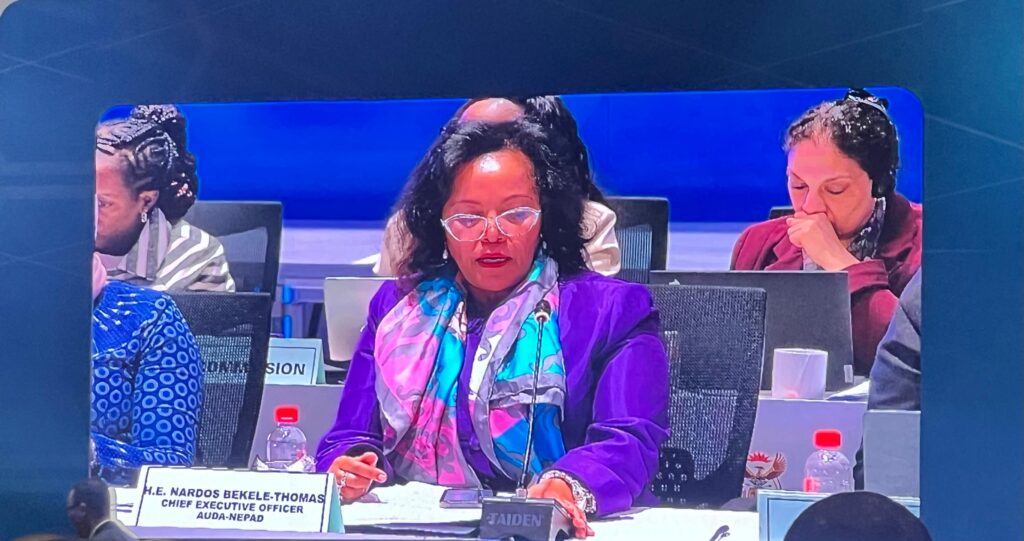
By Baboloki Semele: The Chief Executive Officer of AUDA-NEPAD, Ms. Nardos Bekele-Thomas, has re-emphasized the critical importance of dynamic health financing as a cornerstone of Africa’s economic transformation. Speaking during the 8th Specialized Technical Committee (STC) on Finance, Monetary Affairs, Economic Planning and Integration, held recently in Sandton, South Africa, Ms. Bekele-Thomas declared that “Health is Wealth, Africa’s Imperative for Investment.”
In her address, she issued a strong call to action urging Africa to reimagine the future of health, redefine health financing, and reframe the understanding of health itself. She said at the heart of Africa’s journey toward Agenda 2063 lies a powerful truth-“health is life”.
A robust health system, she noted, is the bedrock of resilience, productivity, and prosperity, and a key pillar of Africa’s global competitiveness. Yet, the continent continues to face a $66 billion annual health financing gap, coupled with a projected 25% decline in external health funding over the next five years.
“The era of dependency on external aid is over,” Ms. Bekele-Thomas emphasized, stressing that Africa must no longer be seen as a charity case but must own her health agenda.
Under her leadership, AUDA-NEPAD is steering the Programme for Investment and Financing in Africa’s Health Sector (PIFAH), a flagship initiative guided by H.E. President Paul Kagame, the African Leaders Malaria Alliance (ALMA) Champion, and mandated by the AU Heads of State Assembly. Through PIFAH, AUDA-NEPAD is mobilizing private sector investment, promoting blended financing, and preparing investment-ready projects that align capital flows with Africa’s health priorities. Ms. Bekele-Thomas underscored that health financing is not charity, but a strategic investment in Africa’s $259 billion health economy, projected to double by 2030.
“Let’s shift the paradigm,” she urged. “Investing in health is investing in Africa’s future.”
A key part of AUDA-NEPAD’s strategy for health sovereignty is the Pharmaceutical Manufacturing Plan for Africa (PMPA) designed to strengthen local production and reduce Africa’s overreliance on imports, which currently supply over 85% of the continent’s medicines. To fast-track this transformation, 24 priority medical products have been identified for local manufacturing, ranging from HIV and malaria treatments to maternal and child health essentials. This initiative is poised to save lives, preserve billions in foreign exchange, and create jobs across the pharmaceutical value chain.
To build trust, Ms. Bekele-Thomas noted, all must ensure that African-produced health products are reliable, affordable, and of the highest quality, adding that this is essential for the African Continental Free Trade Area (AfCFTA) to truly enable trade in the health sector.
AUDA-NEPAD is embedding frontier technologies into its health programs, driving innovation through:
AU Smart Safety Surveillance (AU-3S) – now covering 65% of Africa’s population, improving medical product safety.
African Medicines Regulatory Harmonisation (AMRH) – which laid the groundwork for the African Medicines Agency (AMA).
Integrated Vector Management (IVM) – pioneering gene-drive governance for malaria control.
African Union AI Competition – showcasing the ingenuity of Africa’s youth in digital health solutions.
With over one billion mobile subscriptions, Ms. Bekele-Thomas emphasized, Africa has a unique opportunity to leapfrog into a new era of digital health, powered by data, connectivity, and innovation.
The 8th STC concluded with a call for African Finance Ministers and Central Bank Governors to advance recommendations on debt management, domestic resource mobilization, health financing, and Africa’s common position in global financial reforms. Discussions also advanced Africa’s economic transformation through progress updates on establishment of the African Credit Rating Agency, Africa Virtual Investment Platform (AVIP), Afreximbank Legal Entity Identifier initiative, Model Law on Financing developed by ACBF and Afreximbank and Payment Services Directive for Africa (PSDA) initiative
The outcomes of these deliberations will be presented to Ministers for further endorsement and coordination, in alignment with Agenda 2063’s vision of financial sovereignty and inclusive growth.
Ms. Bekele-Thomas called upon all stakeholders from policymakers to the private sector to view health not as an expenditure, but as an investment in Africa’s most valuable asset: its people. She said a healthy Africa is a productive, innovative, and competitive Africa.